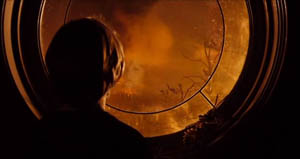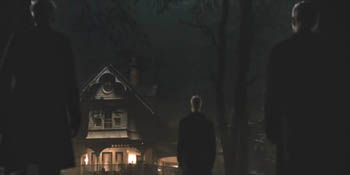|
Knowing is a wonderful thing in concept. By this, I mean the possession and comprehension of facts is a wonderful thing, and not that this movie is a wonderful thing, which it isn't. It is that most annoying of things: an story which postures at being intelligent whilst fundamentally misunderstanding the very ideas which it proposes to discuss. 
In the 1950s, a little girl's time capsule proposal is adopted by her school, which is then somewhat chagrined to find that she herself has contributed not the requested drawing, but a paper full of furiously scribbled numbers. Her teacher inexplicably decides to include it anyway, and fifty years later, it winds up in the hands of Caleb, son of an MIT astropysicist named John Koestler (Nicholas Cage), after the capsule is opened. Koestler is introduced in front of his class, tasking them with the question of whether or not the universe does or does not have a purpose about it. At this early point, my bullshit detector was already beeping softly, placated only by the faint hope that the story would have the decency not to decide the question for us, since popular fiction produced in this country only ever answers this debate in one tried-if-not-true way (Watchmen being the notable exception). Looking over the dense block of numbers, John begins to see frightening patterns emerge, which bode ill for times to shortly come. Is it faulty pattern-recognition, or a portent of disaster? If you're actually unsure, then I can only conclude that it's because this is your first movie. Whether or not the universe is deterministic, one of the basic themes of the film, it's unquestionably true that the story world is unswervingly so. Events are positively predetermined. Story points unspool in precisely the singular way in which they inevitably do in movies such as this. The skeptical scientist who begins by asserting a worldview of "shit happens" buys into supernatural mumbo-jumbo with typically breakneck speed, spending no time at all on pursuing alternate explanations for the numbers of doom. Old friends and new acquaintances decry him as overstressed or unstable, then quickly come around when encountering something they cannot personally account for. The film doesn't even pretend to equivocate on the certainty of prophecy past the half-hour mark. Clues become crazier and more tenuous, and therefore more correct. Children speak like much older characters, and say "consume" when "eat" would be a hundred times more natural. In the midst of all this, mysterious black-garbed figures begin lurking about in the woods and magically whispering to son Caleb and the granddaughter of the girl who penned the numeric code. The MIT scientist written by non-scientifically-minded screenwriters jumps to the conclusion that whatever's happening is centered on the two children without first seeing if anyone else is having similar experiences. The film just continues to throw things like this at the viewer under the assumption that you'll accept them, because deep down inside, you just want to believe that there's a plan for everything, even, as the Joker observed, if the plan is horrifying. Or even, as those paying any attention may note, if the plan and the clues and the detecting is finally revealed (though perhaps not to the writers, who seem to have overlooked it) as more or less irrelevant. 
This film does itself and thinking audience members a disservice by positioning itself as a science-fiction tale instead of the supernatural thriller it obviously wants to be. Trying to tackle "tough" questions only makes it embarrass itself. It tries to pretend that the great debate on existential meaning is between deterministic and random, when it's actually between purposed and non-purposed (I seriously doubt anyone who knows what the term means actually believes in a random universe). On top of this, it gets the core of determinism wrong, dumbing it down to the populist feel-good philosophy of "everything happens for a reason," instead of due to a cause. If you don't see what the difference is, go back and study up before attempting to write any high-minded screenplays. Director Alex Proyas, who previously made the flawed but intriguing Dark City, makes much the same mistake here as in that film by offering up a ham-handed notion of faith as some kind of answer, instead of the gargantuan morass of questions it really is. It's a pity this visual style couldn't have been applied to better source material. Proyas is a good director of images, but keeps trying to attack subjects he doesn't seem to know very well. The film ends with a truly impressive set of effects, beautiful in appearance but deeply unbeautiful in concept, leaving anyone who was invested with these characters likely feeling very unfulfilled. Much like so many real-world answers to life's meaning, Knowing just leaves you wondering why supposedly higher intelligence always seems to work through the most boneheaded plans imaginable. -review by Matt Murray
|
|
||||||||